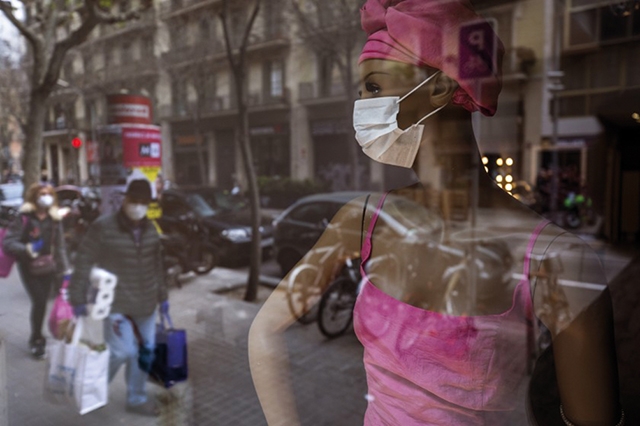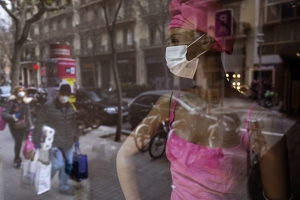Coronavirus Updates: Georgia & the World
Georgia has a total of 33 confirmed coronavirus cases as of Monday, but also some good news: the first Georgian patient to have caught the coronavirus infection has now fully recovered. 637 people are currently quarantined and 54 remain under supervision in hospital awaiting test results.
"The first Georgian patient infected with the new coronavirus has shown full recovery from the illness," Marina Ezugbaia, Medial Director of the Tbilisi Infections Hospital, told reporters, adding that he had retested negative for Covid-19.
The second infected patient, who this weekend tested negative after treatment, is set to have a retest Monday.
"We hope that the answer will be negative and we will have another recovered patient," Ezugbaia said.
The global statistics are more concerning, as countries around the world continue to report new cases of infections and deaths, and to announce state emergencies. The latest reports claim the world has a total of 171,112 Covid-19 cases, 6,526 deaths, and 77,779 patients who have fully recovered from the virus.
The Worldometers online platform states that there have been 84,305 closed coronavirus cases, 8% of which have resulted in death. This mortality statistic stood at 6% for months; last week it increased to 7, and now it has increased by 1% again. This probably comes as Italy on Monday reported 368 new deaths overnight from the virus. The country now has 24,747 coronavirus cases. WHO’s declaration that Europe is now the new epicenter of the coronavirus pandemic rang loudly around the world.
The United States and countries across Europe are closing schools, even entertainment venues, keeping nothing open but essential services, in a stepped-up effort to combat the fast spread of the pandemic, where more cases have now been reported outside China, the supposed origin-country of the Covid-19 virus, than inside its borders. South Korea and China, both wary of imported infections, have tightened requirements for international arrivals, as the epicenter of the pandemic shifted to the West.
Governments of many countries are limiting travel, both inward and outward, in an effort to curb the movement of people, and with them, the transfer of the virus.
Schools in New York are shut and classes moved online, while entertainment venues have been ordered to close from Tuesday, with President Trump’s declaration of a “national emergency” on Saturday.
Another major source of the outbreak, Iran, on Monday announced that more than 100 people had died in the past 24 hours, while confirmed cases had risen to nearly 14,000 in the country. Tehran said its fight against the outbreak was being severely hampered by US sanctions.
Shops in Europe and the US are suffering shortages as people rush to stock up in fear of their countries announcing a lockdown in the face of the pandemic.
Georgia’s fight against coronavirus has been praised by the World Health Organization (WHO). On Saturday, it was reported that a telephone conversation held between the Director-General of the World Health Organization (WHO), Tedros Adhanom, and President of Georgia Salome Zurabishvili, saw the WHO head praising Georgia’s response to the pandemic.
Yet, regardless of the government’s efforts, the number of infected in Georgia has risen from the 24 in our last update on March 13 to 33 on Monday. Amiran Gamkrelidze, Head of the Georgian National Disease Control Center, said that the country should be ready for an increase in coronavirus cases. His comment was an evident prediction, as it was revealed shortly after that two foreign tourists who had recently visited Georgia’s mountains had tested positive for the coronavirus when they returned home, despite having had no symptoms while in Georgia.
One, a Czech citizen, was confirmed with Covid-19 after traveling to Gudauri together with a 6-member tourist group on March 4-9. The other infected person is a Slovak citizen, a member of the same tourist group. Both were diagnosed with the infection after returning to their home countries.
The administration of Gudauri’s restaurant ‘Drunk Cherry’ announced it had closed its doors, as the venue was visited regularly by the two foreigners.
"We are all in self-isolation, the restaurant is closed; two employees have a high fever. Anyone who visited ‘Drunk Cherry’ these days should consult a medical facility,” reads the official statement from the restaurant’s administration.
When this news broke, it was announced that the mountain resorts of Georgia would be closed to tourists.
Following the steps taken by other states, Georgia has also imposed traffic limitations at its borders.
On March 13, Georgia imposed traffic restrictions with neighboring countries Armenia and Azerbaijan, with borders to be closed for 10 days from March 14.
Reportedly, PM Gakharia held phone conversations with his Armenian and Azerbaijani counterparts. All sides agreed on limiting travel in order to limit the impact of coronavirus. The traffic of goods will continue during this time.
When this was announced on Friday, Georgia had already imposed traffic restrictions with Germany, Italy, France, Spain and Austria, with Switzerland, Norway and Denmark being added the following day.
On Monday morning, it was announced that travel between Russia and Georgia, too, would be restricted. The Prime Minister's Special Representative for Relations with the Russian Federation Zurab Abashidze held a telephone conversation with Gregory Karasin, Head of the Delegation of the Russian Federation in the bilateral dialogue (the “Prague format”) about the restrictions.
By Monday afternoon, the Government of the country had decided that Georgia was closing all its borders temporarily, banning all foreign citizens from entering the Georgian territories for two weeks from March 18.
When PM Gakharia’s spokesperson Irakli Chikovani announced the news, he noted that Georgian citizens abroad would be able to return home.
“For the next two weeks, foreign citizens will not be allowed to enter Georgia. Georgian citizens and their family members who wish to return to Georgia may use the air service operated by Georgian Airlines,” he said.
The news came as Wizz-Air announced the cancellation of all flights from Kutaisi International Airport, except those with Budapest, from March 18 to April 3, offering 120% Wizz-Air credit refunds to people who had bought tickets for Europe flights for this period.
Closing the borders is not the only measure Georgia’s government is taking in the wake of the Covid-19 pandemic: at time of going to press, the State is thinking about closing cafes, restaurants and bars, too, reducing their operability to delivery only.
“Today, we must unequivocally discuss and decide about the closure of cafés, restaurants, and bars. Otherwise, it will be difficult for us to manage the situation. The Ministry of Finance should work to mitigate this effect,” the Prime Minister told the Interagency Council.
Levan Davitashvili, Georgia's Minister of Environment Protection and Agriculture, announced that the country’s economy is going to get the helping hand it needs to survive the pandemic. On the PM’s instruction, a working group on food supplies and price regulation has been set up, led by Vice Prime Minister Maia Tskitishvili. This is much-needed to shield Georgia’s citizens from the impact of coronavirus, and the fear the pandemic is having on the country’s economy.
From Monday, colleges and schools of Georgia, which closed on March 2, switched to an online teaching regime in an effort to keep education going, as many Georgians are self-isolating at home or heading out to their family village houses in fear of the virus.
By Nini Dakhundaridze
Image source: LA Times












